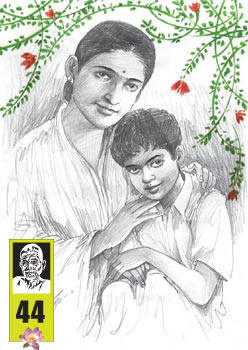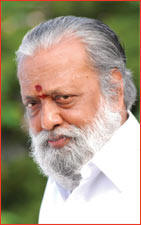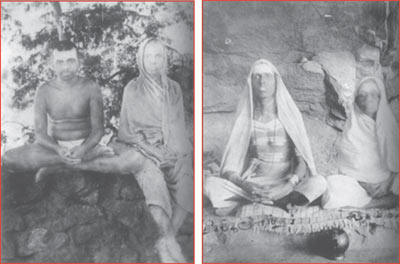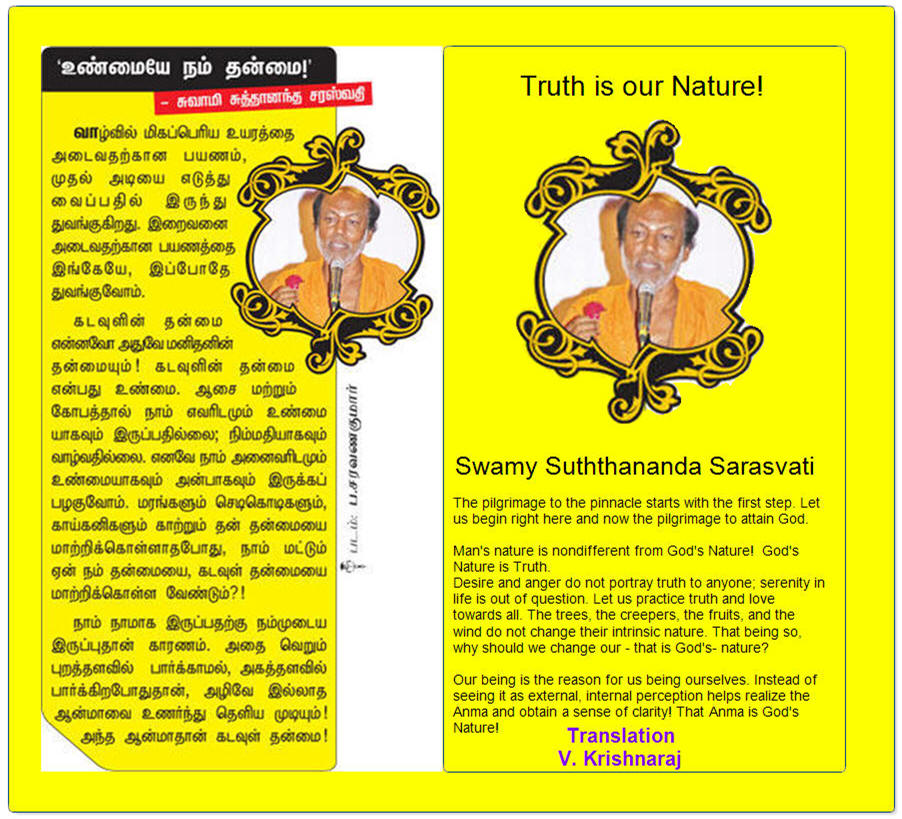Sakthit Vikatan 2011 Dec 13
A woman is happy when she sees her husband accomplish his objectives,
earn fame and name and receive accolades from others. Greater is her
happiness when her son has accomplished rare feats, reach the pinnacle
of fame and receive accolades and blessings from others. Her mind is
brimming over with joy, when she finds her son lives a peerless life.
Here is the mother’s recall of all she did to her famous son. ‘The man
you celebrate, this important person, I raised him on my lap. This man
you pay homage to is my son on whose head I smeared oil, poured warm
water, massaged his body and limbs and brought him up tall. I fed
him balls of softened food. I washed his mouth. I wiped his spit. If any
stranger came to the house, he will wrap his head with the end of my
sari. He followed me wherever I went. He slept holding on to me.’ Her
mouth speaks of her pride and joy. It speaks in volumes of his likes and
dislikes.
Bhagavan’s mother thought she had a part in the greatness of her son.
Here are her recalls: Birth in Tirucchuzi, growing up in Tiruvannamalai,
his deep impression of hearing an unknown person’s name in
Tiruvannamalai, his sitting in meditation with closed eyes, leaving
behind a letter at departure from home, taking the money meant for
college fees for his older brother,
a search for him, finding him in skin and bones on the hills near
Tiruvannamalai with long nails, and matter hair,
seeing him not paying attention to his own mother and resisting
pleas, sitting in Kandasramam in Tiruvannamalai, hearing people discuss,
celebration of him as Brahmana Swamy, spreading of his fame in all
directions, receiving Madathipathis, intellectuals and enquiring
Europeans who paid homage to him and asked for explanations of his
precepts, remaining an incomparable son, having eyes of mercy… Having
Bhagavan near her, his mother
thought what other treasure she needs? Where would I stay other than
here? I will stay with you. Those were her feelings. She came to
Kandasramam in Tiruvannamalai.
Azagammaiyar having lost her husband, is a conservative Brahmin lady.
Bhagavan Ramanar is an ascetic. He did not discriminate. He had
only one possession, his loincloth. She stayed with a friend of hers and
go up the mountain visiting with Bhagavan. Going up and down the
mountain was difficult. She wanted to stay in Kandasramam. The Āśrama
devotees objected to her stay because that would open the way to other
females asking for the same privilege.
Bhagavan was silent. Other women including Dēsūramma
declared, “We will not ask for any residential privilege. Please let
Azakammai stay here. Let her stay with her son.” The devotees did not
accept their plea.
Ramana Maharishi stood up, held the hand of his mother and said, “Let us
go somewhere else and stay there. Let these people stay here.” Bhagavan
was ready to leave with his mother.
The devotees were surprised at Bhagavan’s move. They fell
prostrate at his feet asking for forgiveness. Since that day, Azakammai
stayed in Kandasramam with Ramanar.
Ramana Maharishi never found fault with others. He embraces all.
Likewise, not finding fault with his mother’s observance of religious
austerities, Bhagavan was gentle in condemning them.
Bhagavan made mild fun of her saying, “What is this for?’ He did
not go beyond this questioning.
‘Aḍaḍā
(Oh!)… you touched her. You are now polluted. Go take a cleansing bath.’
Continuing to make fun of her, a
few of her observances waned and disappeared.
She was unhappy to see Bhagavan eat insipid rice balls made from begged
food. She thought of getting kitchen utensils first. Instead of begging
for cooked rice, why should they not beg for uncooked rice and pulses,
which she can cook. She pestered Bhagavan about it. She intended to do
whatever she can. First, he refused to accede to her request saying,
‘you can go home,’ and later understanding a mother’s love, he allowed
it.
First, they acquired a few pots and pans. She would say, “if only we had
a few iron ladles.” Bhagavan would say, “Why not?” Ladles would appear
in the next few days. She would say, “A few tender Brinjals would help.”
Next day a basket of tender brinjals would appear. Because of
Azakambikai, the inmates of Āśramam ate tasty food. She said, “Pappads
would be nice.” The inmates made Pappads (thin wafers for frying) on the premises.
Once when she was going up the hill, a thorny bush tore her sari. The
inmates cleared the thorny bushes and made the path easy to use.
Bhagavan’s younger brother Nāgasundaram⸺later
called Nirañjana
Swamy⸺ was working in Madurai as a clerk.
His wife died and asked his only son to stay with his sister in the
foothills of Tiruvannamalai. He served as a clerk in many places and
having no satisfaction came to live with his mother and son in
Kandasramam. He cared for the visitors. He answered the letters
addressed to Bhagavan. With passage of time, he took the responsibility
for streamlining daily activities. Nagasundaram’s son Venkatraman in the
school would visit Bhagavan often. Sometimes, he stayed nights there. He
helped Bhagavan with his brushing, bathing…Niranjana Swamy arranged to
look after basic comforts of Bhagavan such as, providing good food, rest
and relaxation, preventing nuisance during his rest periods, and keeping
silence at the premises…
In May 1922, Azakammai fell ill. She was short of breath. Realizing her
end is near, she called Niranjana Swamy and entrusted him in his hand
and said, ''please keep an eye on him, He does not know worldly life. You
must look after him.” She closed her eyes.
Bhagavan understood his mother’s time to shuffle off the mortal coil had
come. He stayed close to her. The inmates of Āśramam invited him for
meals. He sat near his mother, asking them to eat without him. He sat
looking at his mother with his right hand on her heart and left hand on
the head. First, she struggled for breath. Since Bhagavan had his hand
on her, the breath became regular. The inmates returned, sat around her
and chanted Rāmanāmam.
Bhagavan later said what happened inside his mother.
“The past life Vāsanās
(impressions) and thoughts came rushing. They were destroyed by the
touch of my hand. If she went without my intervention, she would have
had many rebirths. The Vāsanās
vanished and peace embraced her. As a sign of her life involuting in her
heart, there was a slight vibration. It felt like a ringing of a bell. I
never released my hand.
When I knew that she fully subsided, I removed my hand. In the past,
when Pazhaṉisāmi’s final breath was leaving, I removed my hand and his
soul exited through his eye.
That is why I removed my hand only after I was sure the breath
involuted completely into her heart.
That night at 8 p.m. Azakambikai’s soul merged with her heart.
Bhagavan stood up after a long time sitting with her and told the hungry
devotees, “Let us go for our meals. There is no pollution.” They then
sat for eating.
Bhagavan and others alternately read the Thiruvāsakam. At dawn, they
fashioned the sari into a cradle-cloth with bamboo sticks to carry the
body of Bhagavan’s mother. Bhagavan also participated in carrying her
body.
It was decided to install Samadhi near Bāli
Tīrtham
in the foothills. If Samadhi was built in the mountain, the mountain
would become a Samadhi Hill. That is why they took the body to the
foothills.
They dug a hole. Though they were careful to keep the death a secret,
the news spread. The people came in droves to pay the last respects to
the mother of Bhagavan himself. All accouterments for the funeral like
milk, coconut water, sacred ash, incense, camphor… came pouring in.
Mother’s body was sanctified by bathing her in water. She was dressed in
new clothes with application of sacred ash on her forehead and kept in
public view.
In the Land of Bharath, a plethora of men relinquished everything. None
abandoned their mothers. Bhagavan himself balanced the
Āṉmā
and took her to a state when the world paid homage to her.
The face of Bhagavan’s mother was divine like that of a Yogini and shone
brightly. Building of Samadhi according to Tirumular’s guidance was in
progress. The body was lowered in the pit in a sitting posture. Vibhuti
and Dharba grass were spread. Bhagavan placed in the pit Vibhūti
and camphor. Others followed in the same manner. The pit was filled with
Bilva leaves, red stone powder, Vibhuti…
The pit was closed with slate stone; Liṅgam
was installed and worshipped. When the workers dug the ground around the
Samadhi, water accumulated in the pit. People thought it was rain water.
It was there even after sunrise. Bhagavan asked the workers to dig
deeper and a spring was noticed. Even today that has become a huge well
(of spring water).
Daily, Bhagavan used to go up the mountain and then down to visit his
mother’s Samadhi. One day he stopped going up the hill and stayed in the
foothills. A thatched hut was built near the Samadhi and regular cooking
took place to feed the devotees. This is how Ramanasramam took shape
after the death of his mother.
There were droves of visitors coming for Darśan of Bhagavan more than
before. They worshipped his mother’s Sannidhi. Paul Brunton from the UK
was one of the important visitors. Because of his writings, Bhagavan’s
fame spread all over the world.
https://en.wikipedia.org/wiki/Paul_Brunton
Let us get Darśan.




